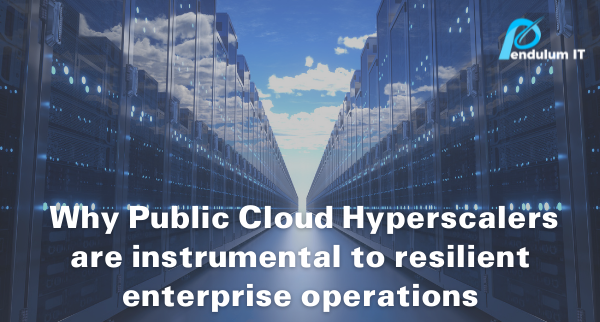
As enterprises increasingly adopt cloud-based infrastructure, they need to ensure that they are resilient and robust enough to meet current and future demands. This resilience is required in areas such as network robustness, the ability to handle varying levels of demand, meet an ever-increasing expectation of user experience, cope with outage quickly and seamlessly, not to mention defending organisations from the increasing complexity of cyberattacks.
To meet these wide-ranging demands and provide a high level of resilience, many enterprises are looking towards using public cloud hyperscalers.

About the Author
Senior Account Manager, Jeffrey Magara helps Global Enterprise & SME clients to deliver consolidating, cost saving IT solutions and projects.
Public Cloud Hyperscalers
Having any level of cloud-based infrastructure for your enterprise will more than likely mean that you will already be working with a hyperscaler.
Essentially, hyperscalers provide cloud, networking, and internet services at scale, by offering enterprises access to infrastructure, via an IaaS model. A list of hyperscalers in the market today will include companies such as Amazon, Google, Microsoft etc. They dominate cloud services and are continuing to grow, as the demand for their services increases exponentially.
These powerful hyperscalers offer services through huge data centres that accommodate fluctuating and high demand. Indeed, their infrastructure is built on thousands of physical servers and millions of virtual machines. The end result, and advantage to their customers, is data centre resources that are easily accessible, cost effective, reliable, and scalable.
What’s more, today’s hyperscalers provide a level of performance way above traditional inhouse data centres. They also have a very clear view on the future, investing huge amounts of money, offering a level of reassurance to their customers beyond the dreams of an enterprises IT department. Microsoft alone have recently announced their investment of nearly $20bn, to build the infrastructure necessary to support its Azure cloud service. This should not only reassure Azure customers, but those of competing hyperscalers, as they are sure to be working on their own future proof projects.
With minimal level of commitment, many of today’s largest enterprises are already customers of all of the hyperscalers, allowing them to pick and choose services that best fit their business and, at the same time, avoid vendor lock-in.
Innovative Hyperscalers
Hyperscaler companies are working hard to offer their customers more reasons why cloud is the route to take. Some of the latest services offered demonstrate this and allow enterprises the opportunity to become agile and resilient without huge investment. Innovations of late include:
- Serverless Computing
Allowing users to write and deploy code without worrying about the required infrastructure. Key benefits include: pay for only what you need, extend and scale to full-stack apps, automatic and instant scaling with usage increase. - Artificial Intelligence as a service (AIaas)
Ready-made AI services in the cloud on a pay as you go basis. - Containers (CaaS)
Allows faster app deployment, optimising resource utilisation, again available on a pay as you go basis. - Distributed Cloud
Expands the traditional datacentre-based cloud model to a system of cloud infrastructure components that are geographically distributed, benefiting performance, redundancy and regulations. - Edge Computing
Brings computer closer to the end user, minimising long distance communication between client and server, reducing latency. - Cloud Portability
Cloud portability tools that help you adopt multi-cloud strategies. Benefits include: no single vendor lock-in, easily switching clouds and inter-Cloud redundancy.
Coping with Legacy Infrastructure
One of the many challenges faced by hyperscalers and their customers, in particular, is how to integrate enterprise’ existing legacy systems with the cloud. This indeed will be a key challenge, as it will open up many enterprises who are either resisting the move to cloud, and or struggling with how they utilise their existing legacy system and indeed its applications. Aware that this is a barrier for many would-be customers, hyperscalers are investing in viable solutions.
Strategic Multi-Cloud Agility
As mentioned earlier, many larger enterprises have adopted a multi-cloud strategy in order to build up their IT resilience and continuous protection. This multi-cloud strategic approach benefits both resilience planning and overall service offering, making it highly beneficial.
Having the ability to store your data in different physical locations and different providers should ensure that you always have access to it, no matter what the circumstance is. This does of course rely on all providers to integrate with one another, allowing you to move data in the event of a problem, but having the flexibility to add and scale services in real-time.
Risk Management
Cloud deployments offer a myriad of benefits, and indeed mitigate many of the traditional data centre risks, however, cloud use does come with its own set of challenges. Further complexity and volatility is added. By their nature the public cloud involves large transactional volumes, open architecture and multiple vendors, all of which contain risk. Also, as mentioned earlier, there is the challenge of how to synchronise with an enterprise’s legacy systems.
To combat these challenges and ensure business resilience, enterprises need to create a comprehensive strategy to cover everything including, provisioning and day to day management of potential multi-cloud environments. Having a clear view of what the enterprise’s critical applications are, will help make sure resources are focussed on protecting them.
Selecting the Right Hyperscaler
When looking to choose the right hyperscaler for your enterprise, due to the very nature of what they offer and how they integrate into the very core of your enterprise, you should be looking for a partner rather than a supplier. Afterall, this should be a vital strategic move for the enterprise.
Some key areas to think about when selecting your hyperscale partner are:
- Consider your existing architecture, technologies and operating systems when selecting a provider.
- What are the specific needs of our enterprise in terms of cloud infrastructure? There will be some cloud hyperscalers who better suit particular industries
- Consider using more than one cloud hyperscaler. As mentioned earlier, many enterprises have strategically spread their risk by using more than one.
- Do you utilise the provider’s platform services or build and maintain your own?
- Opportunities to co innovate; Hyperscalers are sometimes willing to partner with customers to build new services, in niche fields.
What is very clear, for enterprises to make the most from cloud computing, they need to understand what it is they wish to achieve, identify their critical applications and have the backing of the board. Many organisations have suffered from an experimental mindset, stalling the project, as no clear direction has been set. Others struggle to make a clear business case. With the advent of the COVID-19 crisis, it has been a wakeup call for many enterprises, of the importance of systems resilience, agility and scalability.
To gain the advantages of the cloud, there needs to be a high level of commitment to migrate and scale the majority of the enterprise’ workloads, this is where the true business value is.
If your enterprise is looking to take greater advantage of cloud-based infrastructure, or indeed make the first moves towards the cloud, having a partner who can help guide you through will be invaluable to making the right decisions. Pendulum offers design services for Google Cloud Platform, AWS and Microsoft Azure, along with support and expertise, to help you get the most out of your organisation’s cloud infrastructure.
About Us

Pendulum is a leading IT company providing services, hardware and software across the UK and internationally. For further information on remote working, public cloud hyperscalers, cybersecurity, modernising the data centre, HCI or any other area please contact your account manager or email info@pendulum-it.com
